Success at What Cost: Students, Stress and Suicides
Total Views |
India Policy Foundation Webinar on
"Success at What Cost: Students, Stress and Suicides"
August 26, 2023
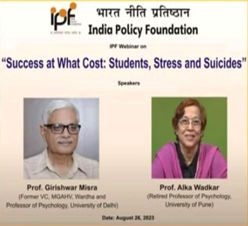
Speakers:
Prof. Girishwar Misra
(Former VC, MGAHV, Wardha, and Professor of Psychology, University of Delhi)
Prof. Alka Wadkar
(Retired Professor of Psychology, University of Pune)
Moderator:
Dr Kuldeep Ratnoo
(Director, India Policy Foundation)
Dr Kuldeep Ratnoo:
Namaskar! I welcome you to today’s webinar on ‘Students, Stress and Suicides’. In recent times, there have been many cases of young students committing suicide. Most of these students were preparing for engineering and medical entrance exams at Kota or similar coaching hubs. These students were unable to cope up with the parental and societal pressure for academic excellence. The students do not have any experience in dealing with external stress and pressure. There are a lot of social, economic and psychological factors involved in this grave issue. Our education system and our examination system are also posing problems for students.
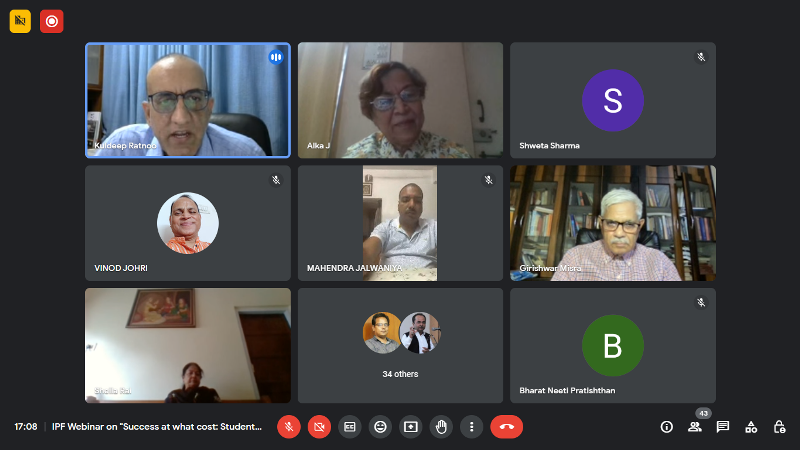
Today, we have with us two renowned psychologists to throw light on this issue, Prof Girishwar Misra ji and Prof Alka Wadkar ji. They have taught psychology for many years, have written books, articles and conducted in-depth research on various topics. Prof Girshwar Misra is renowned in the field of psychology. He has written and edited umpteen number of journals. Prof Alka Wadkar has worked a lot in the study of stress and has counselled thousands of students. So, before starting the webinar, I would like to formally introduce both the speakers.
Prof Girishwar Misra is a social scientist, psychologist and author from India. He obtained his M.A. and did his Ph.D. from Gorakhpur University. He started his career as a lecturer of psychology at the same university in 1970. Thereafter, he joined Allahabad University and then joined Bhopal University as professor. He taught there for 10 years, till 1993 and then he joined Delhi University as professor and retired from there. In 1991-92, Prof Misra was a Fullbright Fellow in the United States at Swarthmore College and at the University of Michigan. He was the Vice Chancellor of Mahatma Gandhi Antarrashtriya Hindi Vishwavidyalaya in Wardha. Prof Misra is the chief editor of the fifth ICSSR Survey of Psychology published by Indian Council of Social Science Research. He has also worked as the editor of Psychological Studies, a journal of the National Academy of Psychology, India. He has been one of the leaders of the emerging field of Indian psychology. He has guided hundreds of Ph.D. students and has written for numerous publications and websites. He has authored many books and has contributed significantly to the study of Indian psychology.
Prof Alka Wadkar, our second speaker today, is a psychologist and writer of many books. She is associated with various institutes for differently-abled individuals and other institutes. She has rich experience in teaching, research and socially relevant work. She has taught psychology in the Department of Psychology, University of Pune for more than 30 years and has been guiding research students for Ph.D., M.Phil. and M.A. for more than 25 years. She has written more than 15 books. She has also written several textbooks for different universities. She has published and presented many research papers in regional, national and international contexts. She has been a regular faculty for various academic institutes and government organisations for conducting workshops, delivering lectures, conducting training programs. She has contributed substantially to government training programs such as Sarva Shiksha Abhiyan, Anganwadi and others for the welfare of women and children. She has also been associated with Government of India, Government of Maharashtra as an expert for various competitive exams.
First, I request Dr Alka Wadkar ji to give her address. Thereafter, we will request Dr Girishwar Misra ji to share his views.
Dr Alka Wadkar:
Thank you very much for such a nice introduction! It is a wonderful opportunity for me to be with you and it gives me lot of pleasure because of two important things. On one hand, I am getting associated with this esteemed organisation and on the other hand, we will get the guidance from my senior colleague Prof Girishwar Misra ji who is internationally known for his work. I hope everybody is aware of the fact that during this month itself, a young guy who was appearing for NEET, who appeared twice but could not get through, killed himself. Immediately after that, in a day’s gap, his father also killed himself. Sadly, there are number of youths who are killing themselves. It is a burning problem all over India, not only India, but all over the world actually. Such cases are happening every day and it is difficult to manage for the parents, teachers and even for the whole community. I would like to congratulate you sir, for selecting this very relevant and significant topic. This is an important application of psychology in the field of social welfare and psycho-social health of youth.

If there is no stress, will we be very happy? Definitely not. We are not very happy if there is no stress. If there is no stress, the person becomes unhappy and he is not motivated to do anything, and boredom and frustration follow. If there is extreme stress, the person is overburdened and the person is upset because of that. Due to which, he takes such steps. The whole science of psychology basically depends on the fact that there are individual differences and these individual differences are responsible for the responses that the person gives to a particular situation, to a particular demand, to a particular type of challenging situation. He is not capable of deciding what is to be done, he is not capable of facing the situation or coping with the situation and so on and so forth. So, it is difficult for him to understand what can be done.
Recently, in Chennai, on August 19, a young girl who was a student of class 12, committed suicide because her teacher scolded her in front of the class and she was insulted very badly and she could not deal with the situation. The basic point is that there is huge amount of stress on students. Of course, academic stress is the most important thing but that is not the only thing. There are n number of other co-relates which are related to academic stress. It is a cumulative effect of different types of stresses that the individual is facing or has to deal with. In academics also, the basic thing which I would like to highlight, but is not accepted by our community, is complete lack of vocational guidance. Parents are not aware that they should be able to understand the details of what the findings are regarding various types of testing and various suggestions given by the counsellor. So, many a time, there are ‘able misfits’.
The students who are involved, motivated, who want to do something great in the field, maybe they don’t have the aptitude necessary for that, maybe they don’t have the interest in that particular area, they don’t have the particular intellectual level also. These are the basic issues as far as academic stress is concerned. As I am in the field of counselling for a number of years, I have seen that some students are doing their engineering for 8-10 years because it is very difficult for them to deal with mathematics. They don’t have that particular capacity to understand and still their parents are insisting that they should do only engineering and nothing else.
There are many things that we have to discuss in detail and one of them is of course, to what extent parents are responsible, to what extent socialisation practices are responsible, to what extent child rearing practices like inconsistent and very harsh discipline, the interaction between parent and child, the communication style, they are always in the parent state as far as transactional analysis is concerned. They are never friendly with their children; they never respect their children. There is absolutely no unconditional positive regard and there is no unconditional positive acceptance. They are always thinking about some grades, marks, admissions and the like. The basis is loud and clear. If you get this much of marks or grades, or if you get admission to this particular institute, only then should you come with us to this holiday trip. All of us are finding that there are certain types of conditions nowadays. On top of that, parents generally have the view that they are providing everything that is essential for studying and still their ward is not studying. So, they think that it is injustice done to them and they are very unhappy and keep on nagging the ward and obviously, interpersonal relationships are spoiled to any extent.
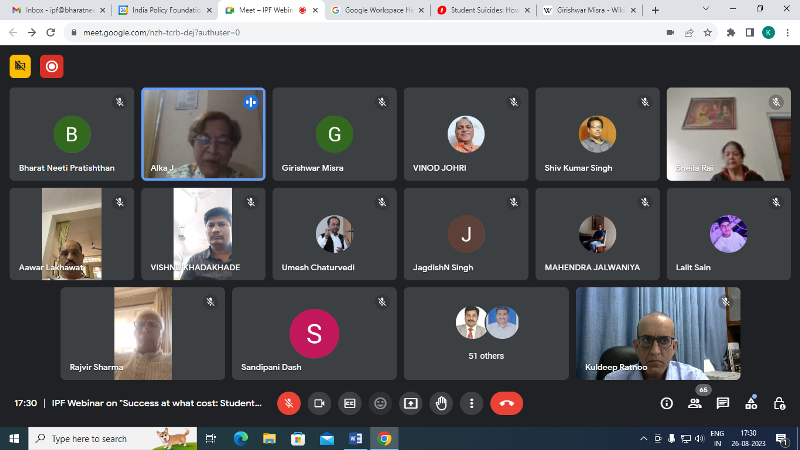
We generally say that we have to respect our own children. The sentence is difficult to digest. But even if your child is two years old, five years old, ten years old, we have to respect our child. And this is where we, the Indian parents are lagging behind. We think that we know everything about the child. We think that we are capable of making all the decisions properly, rationally and logically and the offspring, the son or daughter, they cannot understand anything. They are too young to understand. But I must tell you very frankly, especially those who are not from psychology, it is essential to understand the interest of the child, the aptitude of the child, the way in which the child can prosper in future or maybe potentials as it is called in psychology. So, what are the potentials. There are examples. There is a very good choreographer called Ashish Patil. He was interested in choreography right from the beginning. But his family members were completely against that. He tried to kill himself thrice. But today, he is a very well-known choreographer and very successful also. So, the whole thing starts from the family. The interaction of the person with the parents, the interaction with the siblings etc. For example, take comparison. Comparison is so harsh and the way in which it is constantly being done, like your brother is getting admission in IIT /IIM, but you are not getting it. Every child is different. How could you decide about what the nature has given him, in which area he can prosper and all that. These are the simple things but they are taking the shape of a horrible and unfortunate chaos in human life.
Every year, 46,000 students kill themselves all over the world. From 15-29 years is the most vulnerable age as it is reported by the studies. In every 40 seconds, one student kills himself or herself. If you consider the male-female ratio, it is 2:1. That is, for two males, there is one female who is killing herself. One important thing that we should also take into consideration is that there is absolutely no frustration tolerance in the younger generation or less frustration tolerance. Because their parents are providing everything for them, whatever is necessary for their comfortable life, for their ideas of comfort, aspiration or enjoyment. So, there is no delay of gratification. They don’t want to struggle hard to achieve something. They want their parents to pay and get the admission.
The National Crime Records in 2020 has given the statistic that 35 students commit suicide every day in India. It appears that the person wants to kill himself when it comes to suicide cases. But it is not necessarily the same, in the sense that some of them are just pretending or threatening the parents. They want to take undue advantage of this particular emotional threat that the child may do something or the child may kill himself. So, they will provide more facilities or money or whatever is required. This is called as suicide gesture. There is no intention to kill oneself. If they are killed, it is just by accident. There are some students who are actually trying to kill themselves but they are not capable of doing that. So, maybe halfway, they are saved. There are various ways in which students are killing themselves. They either take poison or they use firearms etc. Unfortunately, there are some contiguous suicides that are reported in research in India.
So, there is a complex and complicated interaction between different factors. Is it that only parents are responsible? Is it that only environment is responsible? It is not like that. The first important thing is that genetics are playing an important role in suicide. If you see the reports, there is some history in the family. There are some suicides and the next generation is also thinking about the same. Then there are biological and biochemical factors also like it depends upon the level of serotonin. What I am trying to tell you is that there are some complex and complicated affairs which we cannot control. There are some social aspects, some psychological aspects and so on and so forth which are responsible for that. There are some environmental aspects.
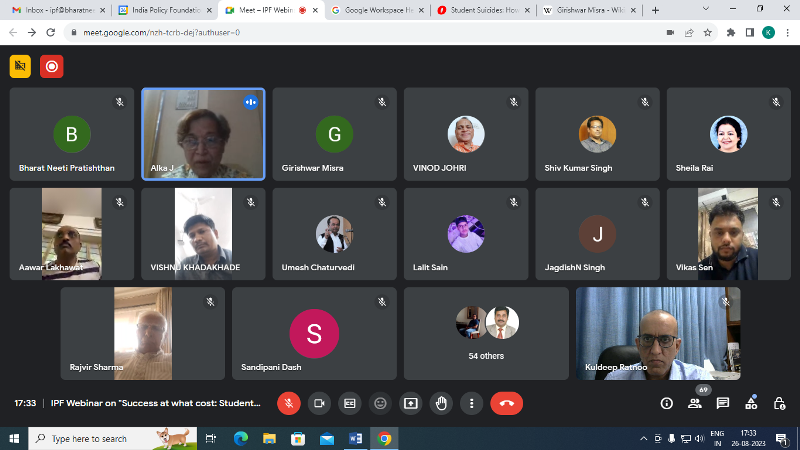
As far as family is concerned, support from the family and complete unconditional acceptance, whether the child gets success or failure, whether the child is capable of doing it properly or otherwise and whether the child is getting admission or not is important. Actually, I think when the child fails, he needs more love and more affection. He needs more support from the family. He needs that somebody should be able to understand him. He needs that somebody should be able to share his feelings and thoughts. He needs that he should be able to rely on somebody for getting into the regular mood and routine.
As far as this pressure is concerned, nobody tells them that this is not the end of the world. Even if you don’t get admission, there are examinations going on every year. Even if you are not getting into this course, you can do something else. Why not? There is no hard and fast rule. For example, if you see You Tube, you can see that there are many successful doctors who are actually telling the younger ones not to get attracted to medicine. It is not a cakewalk, it is very difficult to complete studies and for years together, you have to struggle hard. And there are n number of malpractices and you have to struggle hard for 24 hours and there are various responsibilities which are beyond imagination. But without knowing about the problems, the child gets attracted to a career. The child does not notice the task of an engineer, duties of a doctor. He does not know anything. But he is attracted to it because the whole society is trying to force every student that if you want to get some respect or a fat salary, then you should complete these courses.
What happens to the aptitude when he does something he does not like. If he is not getting satisfaction in studies, he expects many things from the family. The balance is completely disturbed because the family is not capable of supporting him or maybe according to his convenience and expectations.
Then there are economic problems in a country like India. Of course, there are cultural problems and otherwise also. There is a force, there is a demand, there is constant tension that is created. They keep on nagging, they keep on telling him, he can do it and he cannot do it. The person just wants to get rid of these things. I know some individual students who just leave their families because they want to get rid of all these interactions. They are not happy about it and they want to do something else and the parents are not ready to accept it. So, they just leave the family and they do not return at all for the whole of their lives.
That reminds me that WHO has reported long ago that there are two important things that Indian students are suffering very badly from – the first is undue expectations from the parents and the second is impulse control regarding sex. These two things are very basic things. The first one, undue expectations of the parents are not generally seen in most of the advanced countries. They are comparatively more aware that whatever the child is doing, let him do it.
At the spur of the moment, a person may think that yes, I have to kill myself. That also reminds me of a very well-known Hindi movie, 3 Idiots. There are three different kinds of suicides in the movie. Two of them are shown and one of them is suggested. After that movie became popular large number of students started killing themselves, even in high schools. The only thing that we should remember is that they perceive that killing oneself is the solution to the problem. The impact of mass media is so strong that they also perceive that killing oneself is the basic issue and that we can do whatever we want to do and kill oneself. We have to also think about our mass media, mass communication and the style in which they are depicting things. It should not be at least shown as the ultimate solution to the problem because that gives a very wrong impression. When we watch television, our left brain becomes comparatively lazy and then we accept whatever is the message given to us. Obviously, that has got more impact on us.
As far as stress is concerned, there are n number of factors that are responsible for cumulative effect of stress. And these factors are responsible for suicide. For example, disability accidents, traumas, calamities or anything else. There are number of things that are happening in day-to-day life situation which are multiplying the stress that the individual is suffering from. They are craving for attention because there is absolutely no communication. Huge amount of theoretical and practical research has been done from Freud, Adler, Jung. There are so many theories regarding suicide and all of them are trying to say that it is unbearable tension or stress that the individual is suffering from because of which the person is killing himself or herself. It was Beck who said that it was hopelessness, helplessness, worthlessness and burdensomeness. If a female is told that she is a burden for the family and they are spending a lot of money for her and she is not doing anything properly etc. Those who are hopeless, according to Beck, 91 per cent of them are thinking about suicide. They are planning about it and they are depressed. So, depression is one major cause and India is the most depressed country, as you know. All over the world, there are people who are suffering from depression. So, depression, anxiety and all the early symptoms like worthlessness, hopelessness, helplessness etc. As far as helplessness is concerned, from the beginning there are no gender differences, there are no traces regarding helplessness but the person goes through it.
When it comes to causes, there are n number of attractions, there are hormonal changes, they are attracted towards pornography, there are different types of things that are available easily. That is how internet plays a part, they get into drug addiction, alcohol addiction etc., so, all these things are ultimately responsible for their failures and suicidal thoughts. If you consider the world, most of them who commit suicide or who are interested in committing suicide, they are having some clinical issues or some psychiatric problems. But in India, it is not like that. So, maybe there are certain things where the person takes the step without having any psychiatric problems. Nowadays, premarital sex is becoming very common and there are n number of sexually transmitted diseases, there are n number of problems that they are facing. Let us take one example. Oral sex is becoming very popular and nobody knows that it leads to oral cancer. There are hedonistic tendencies that are increasing in day-to-day life situation. There are websites which are actually trying to guide the young ones as to how to kill oneself. They are called as pro-suicidal sites.
So, by and large, we should be very particular about the individual’s behaviour. We should think about developing resilience, developing hardiness, assertiveness, proactivity and positive thinking right from the beginning in our children. What is the positive side of their lives? There are n number of options that are available and nobody in this world is getting everything that they want. The second thing is whatever you are doing, you should enjoy it because cognitive stimulation generates lot of enjoyment. We don’t respect our children even when they tell us that this is not what they want to pursue, we try to compel them to continue something. I think I have said enough. Thank you very much!
Dr Kuldeep Ratnoo:
Alka ji has thrown light on a number of topics like the stress on our youth, parental expectations, how the information from different sources are affecting youth. The larger issue as I understand is that there is a lot of pressure being put on students saying that they need to study well so that they can get a big salary package. Earlier, we used to study to gain knowledge and to get respect in society. Now even if you miss admission to one college and get into another, it feels like it is the end of life. Next, there is an information overload on the youth. There are so many choices that they have, in terms of everything, in terms of career, education and subject matter that they are unable to focus on anything. All these lead to several problems. So, now I request Prof Girishwar Misra to give us a wider perspective on these issues, in terms of societal and psychological perspectives.
Prof Girishwar Misra:
Namaskar and I thank everyone for taking their time out and being part of this webinar. Alka ji has touched upon all the points and has kept the entire canvas in front of us.
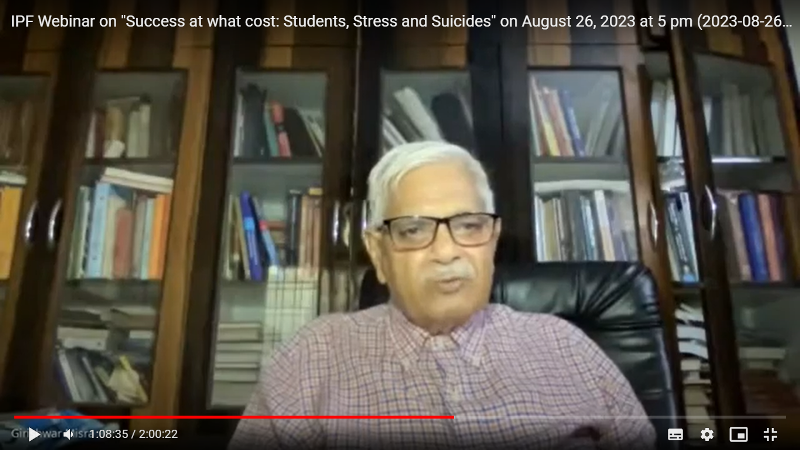
There are two aspects of suicide which are very evident to us. First is that at the individual level, the person has no escape, no other way out. He/she is unable to see any other path than giving up and there comes a point when they take the drastic step. Second, there is some kind of lack of regulation, lack of control, lack of organisation, which happens at the societal level. The person going through the emotional upheaval does not have any meaningful information that the changes happening at the societal level will help him to stop resorting to this measure. These are two big fault lines which are interconnected and influence each other. It is indeed shameful that every hour a student takes his/her life. It is also unfortunate that even the so-called developed countries like Japan, South Korea and America are paying the price as the rate of suicides are exponentially high there.
Now the question arises that the social philosophy or social ideal by which we need to lead our lives, what shape should it take? In today’s time, it is said that happiness, success etc. are taking us to the direction of what we term as ‘high arousal’. There is another word which has become extremely rare and for which people are paying money, that is ‘relaxation’ or ‘mental peace’. On the other hand, the easy way is to become more aroused. Relaxation or mental peace has become low arousal. We are unable to strike a balance between arousal and relaxation. There is greed at the family, society and individual levels. If we want to become the world’s largest economy, then we will have to pay a price for it. The world’s largest economy will also bring with it, its share of worries. Is there any billionaire who can get sleep without taking sleeping pills? It is impossible. The central question before us is how to strike a balance between success and relaxation. Those who had to regulate this at the societal level are falling short.
A word that was very important for us was ‘dharm’, which means virtuous conduct. This determined what we should and should not do. You take any Indian system of thought, Gandhi emphasized that you must keep only that much which is required, not more than that. Here, how much do we need and how much will give us contentment is a very deep question. I read somewhere that contentment is perception of completeness. It is the exact opposite of greed. Even our education system is not trying to teach this perception of completeness. If a child gets 24.5 out of 25, they get asked why didn’t they score 25. And the child is also disappointed for not scoring full marks. I am seeing that. On one hand, we teach about individual differences while on the other hand, we force everyone to have everything. This is reinforced by media, writing, teaching, learning practices.
I was in Delhi University for nearly 22 years. An area close by to the campus is Mukherjee Nagar which houses more than 50,000 aspirants of various competitive exams. There are so many coaching institutions. Now, we don’t have a single exam for which coaching is not offered. There are even coaching institutes to provide coaching for entrance exams for Ph.D. It starts from very early age. If you see, the biggest advertisements in newspapers are that of coaching centres and that too on the front page which is worth lakhs of rupees. How are these coaching institutes thriving? Through these advertisements, you are creating an emotional and motivational climate where in this kind of competition, there is an inherent kind of violence. This fighting goes on continuously at the individual level. But now we have many examples where people have left their career and moved to some other field. There are examples of engineers having turned into musicians. Rajnikant who was a bus conductor is now one of the biggest movie stars.
There is this notion in society that the more you earn, the better it is. The unfortunate thing is that there is very little emphasis on quality, whether it is teaching, whether it is research, whether it is writing or doing anything. So, the way our social standards are getting weighed down, is a question of social concern. We do not have mental peace. For that, we will take tranquilisers or eat medicines or will do something else. That has become the situation. So, this shift that has happened is dangerous and unfortunate and I don’t know whether there is any possibility of return.
So, the stream of social change is very important. I understand that today’s discussion is limited to students. But if you look at Maharashtra, the highest rate of suicides is among the farmers and this is the highest in India. The next is Tamil Nadu followed by Karnataka. If you see, all the money and power is there is Mumbai, yet this happens. So, suicide rate is becoming higher in areas where there is money and prosperity. Moreover, farmers as a community believe in simple living. But even there, pressure is put to increase their yield and earn more money. I have personally witnessed the impact that this has on society.
So, the social changes that have been happening, the change in values are happening at a broad level. Everyone is focussed on how to earn more money. It is one big challenge to maintain this façade which becomes impossible. It is not possible to laugh and have puffy cheeks at the same time. If you want that, you have to pay for it. We are taught to have dharm, arth, kam, moksh as objectives in our life. Earlier, even if there was only a little to eat at home, that was happily shared with the guests. Now there is no concept of sharing or mutual responsibility. What I am saying is that from a collective spirit to an individual centric spirit where you want to have more and more and where you want to capture all that you see is the biggest problem.
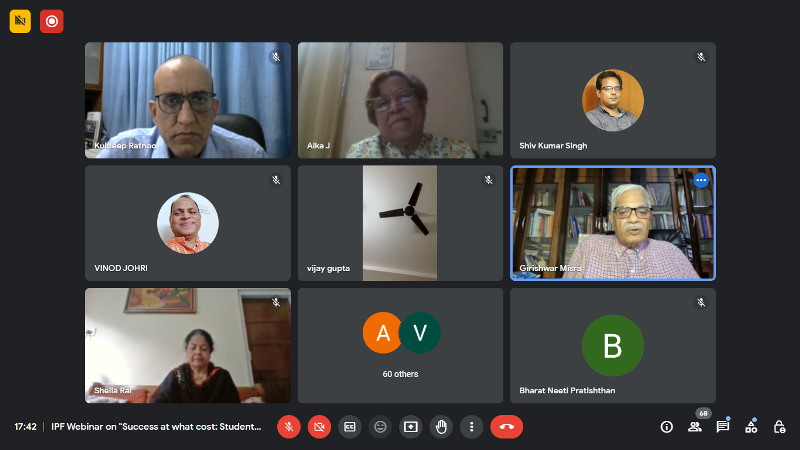
You have put a child who does not understand Mathematics in a coaching centre to give the engineering entrance exam. For years, you are pushing a child who does not understand biology to become a doctor. And when it comes to marriage, people insist that they wouldn’t marry if the salary package is less than so and so amount. And if the person becomes an IAS officer, there is a separate list that is made where the demand for dowry goes as high as few crores. In the kind of change that has taken place, where sharing, mutual respect, inter-dependence are seen as meaningless. People are only concerned about themselves and their lives. Partly, that is also responsible for this kind of orientation. Recently, a celebrity director committed suicide because he was under huge debt. So, if you see this in a sequence, you can see that money has become the biggest challenge. Ego has become the most important component. People are immersed in their egos and self-love. While the Indian thinking was you have to lose your ego, the existence of ego has become our biggest challenge. Did you see how in Kullu, eight big mansions were destroyed in the landslide? Before that also, there were several such incidents. Is there any connection across all these things? You are building these big houses on mountains but if people do not survive, how will you have a future? One has to think about this very seriously.
It is important to bring about a change in our education system. Relaxation is important in our lives, mental health is also important. Even money is important, but for what? Your body has to be used properly. Body is not the ultimate. Our changing physical views, increasing consumerism and commercialisation have a huge influence on our thinking. We have even converted education and learning into a marketplace model and there are consequences for the same. We need to rethink our entire model of education. There are students who want to become doctors and engineers. They enrol themselves in coaching institutes in Kota, and many other places. There are also online coaching classes. They live in these small spaces thinking once they crack the exam, life will become easy. But what happens when someone becomes a civil servant, gets caught on corruption charges and is forced to spend the rest of his life in jail? It is already happening. In Jharkhand, a principal secretary was arrested on corruption charges. The game of greed is spreading everywhere. It causes problems to the individual as well as society. The two are connected and we are not recognising this. In education, healthcare, judiciary and in every other field, money seems to be most important. Can you get even a small work done in a court without money? This is a symptom of our society’s downfall. It shows a degradation of our values.
You look at our independence struggle. Chandrasekhar Azad and Bhagat Singh were ready to lay down their lives. It is a big question as to for what purpose you are giving up your life? In a suicide, we determine the causal factors after going through the suicide note, talking to people etc. But we will never know the real cause. Remember, the chaos surrounding Sushant Singh Rajput’s death. It is very difficult to decide the exact causes. Ultimately, the greed in society at the individual level and at the parental level get converted to emotional pressure and the person has no escape. Neither has he any escape from the world and nor can he escape from his own self. So, he takes the drastic step to escape from the situation that he has found himself in. There are many factors like predisposing or precipitating and the list is very long and very relevant. But we cannot determine who comes first in the list and who comes later.
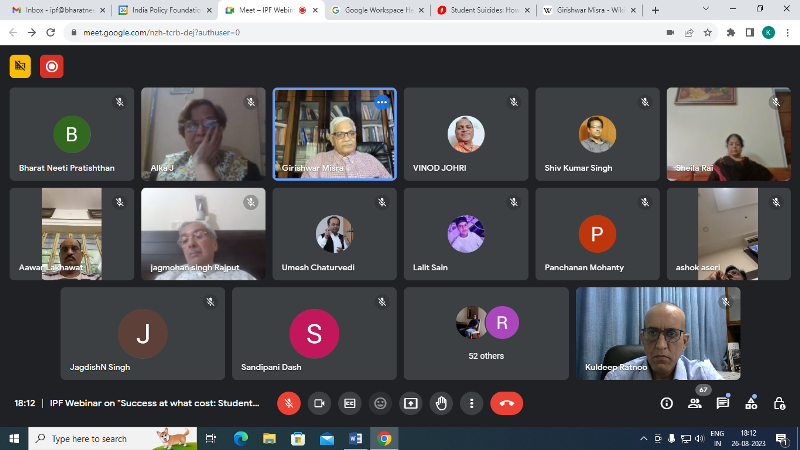
It is very important that the way we socialise, we instil values in our children. Discrimination experienced by children is one of the major factors causing such problems. They collect the experiences they gain from their teacher and parents and go forward with it. They don’t take the decision of committing suicide in a day. It builds in a gradual manner. These significant factors contribute to the decision. They feel that all the doors have been shut and there is no option left for them to get out of the situation. Till the time we make an effort to change the parents’ perspective and bring about a change in society through education, the rate of suicides will not decrease. Unfortunately, we are letting the students get caught in a web of exams. There is an exam for everything now and there are coaching centres being opened to help students with these exams. I remember in 1967-68, admissions to IITs were based on the B.Sc. marks. Now you look at the way students prepare for GATE exams. Everybody is not equally bright but they all want to get in. There is no control on desire. Anybody can desire anything. There are a lot of ways to deal with the consequences of underserved desire, some of which are right and some of which are wrong. You are already seeing the effects of this in society.
So, we will have to intervene in this whole situation. We need to make the parents and society understand how to treat a child and how to interact with a child. How do we communicate that suffering and pain is also part of life. In Gita, it is said that we have a choice over our karma or what to choose but the outcome depends on five factors and you are one of them. Don’t think everything is in your hands. That is not the reality. Somewhere we have lost that clarity. There has been a degradation in society’s value system.
There has been a lot of mention of media. What are the things that were nurtured and nourished through this? What are the stories being sold through media? We are doing the exact opposite of what we want our society to be. Here, somebody else is determining the path for you. So, what we are receiving from the social environment, what is being thrust on us by our social environment needs to be unpacked to understand the real situation. It will become clear who is using what means, and how they are telling us how to live and how not to live. With such constant pressures, it becomes difficult to save oneself. The support that the students should get from their environment, parents, teachers or media is missing. And we do not seem to be in a position to make meaningful interventions. Some solutions are emerging on how to deal with this situation. But only time will tell when can these solutions be made effective or how successful we will be. You read the document on education policy where there are mentions of how these steps can be taken and where students are given an opportunity to express their creativity. The coaching centres have carved out a path for students where they are constantly told to follow the path and not to give it more thought. The students are being told not to think in a new or different way.
If you see, we are continuously reaching the multiple-choice questions. The biggest irony is that even for teachers’ selection exams, multiple-choice questions are being asked. They no longer have a chance to put forth their opinions through subjective questions. They can not write even a sentence; they just have to mark the correct answer of a question. Earlier UGC-NET exams used to have subjective questions but they have stopped it. Now results can come in one day and that has become the focus. We want qualified teachers but from where will we get them? We will need to solve the complexities that we have created. I am saying all this because Alka ji has already covered all the important aspects. The picture that is being formed of our values, of socialisation has taken a dangerous form. The changes that are taking place in such a fast pace are constantly putting pressure on students.
If we want to make lasting changes, then we have to bring about societal transformation. Our notion of self was always independent of money. We always used to consider self as Sat Chit Anand and our own experience is different from reality. Now most of us live in an illusion. The person who commits suicide also is living in such an illusion and kills himself. He is under the illusion that he has run out of options and what we see are the negative effects of it. This is a symptom which points towards the failure of our system.
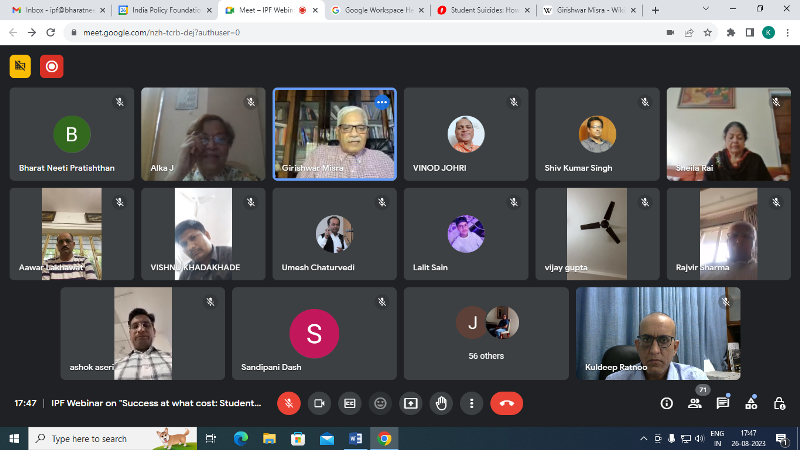
Why is our education system not aligned in a way that we don’t require these coaching centres? Did we have so many coaching institutions before? What are those conditions which gave birth to so many of these coaching centres? It is not like the number of students have risen exponentially and to cope with it, we need such institutions. Learning used to happen earlier too. Money is the main reason behind these changes. We have these institutions so that they can extract more money. And a lot can be done with money. This centrality has to be demolished. This requires a huge revolution and if we don’t bring about a transformation, the current situation will remain the same. Even if you deploy 100 police personnel in place of four in Kota, it will not be a solution to the problem. Another Kota will come up somewhere. Mukherjee Nagar is no different from Kota. You see the same scenario everywhere. Till the time we keep putting pressure, no solution will emerge. To overcome the consequences that we are seeing today, we will have to bring about some deep changes. It is broader question relating to our society that stands before us. We need to make policies for the society that we want to create.
Today corruption has spread everywhere. Look how it has grabbed the whole system. Somewhere, we need to stand up and find solutions for this. Surgical strikes are necessary to bring about changes in these fields. I gave an example of why we are not giving subjective questions for selecting teachers. We made these changes for our convenience. It should not happen this way. The problem before us is a symptom that point towards greater ills of society. No major changes will happen if we keep treating the symptoms.
I will conclude my talk here. I wanted to point out that right now we are only looking at temporary solutions. Finding permanent solutions is not an easy task. In Kota, coaching centres encourage the students to not to go to schools and spend their maximum time in the centres. Students are taking the exam without attending their schools as everything is taken care of by the coaching centres. We also feel it is not important as the focus should be on competitive exams. We need to seriously consider the areas where intervention is required. Thank you very much!
Dr Kuldeep Ratnoo:
Thank you so much, Girishwar Misra ji. You spoke at length about how our society, education policy and even the exams are responsible for putting a lot of stress on our students. Thank you for enlightening us and giving us your guidance. I also believe that in our education system, we are making students ready for the job market but we are not imparting them life skills. Earlier in our joint families, within communities and villages, students were informally imparted these skills. But now with nuclear families, that is no longer the case. Even the rooms remain closed in these families as everyone wants their individual space. For most of us, mobile phones have become our constant companion. For students, it has become their life and they search for all their solutions in that. Because of this, mobile phones have also become the source of all the problems.
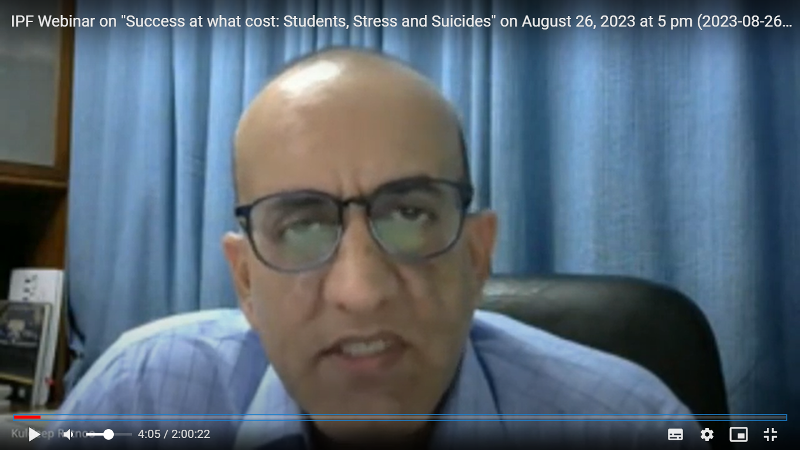
The point that you made is very significant that in the desire for excitement and arousal, we have forgotten all about relaxation. It is from here that all the problems also arise. We are unable to control our anger. We are unable to bear loneliness. Both the young and the old are equally affected by anger and loneliness and they end up killing themselves. In our traditions, we believe that we have several births and we view life through this prism. We believe that if we don’t overcome the difficulties and challenges in this birth, then those get amplified in the next birth and a person will have to suffer more. So, it is better to be brave and let go of the anger. Every problem has a solution.
In my life also, I have seen thousands of students who study something and then go on to do something else. I was a student of physics and maths and had the plan to do engineering. But then I changed my mind and went on to do B.Sc. and then M.A. in Psychology. First I became a teacher of psychology, then I became editor of Swadeshi Patrika even though I had no background in journalism. When I became a teacher, I had not done B.Ed. After my editorial stint, I joined the shipping industry. After that I went to the development sector and then returned to media where I was in the management. Then I worked in the coaching field after which now I am heading a think tank. So, we never know where life will take us. I don’t think there is a boundary line which decides if we study one subject, then we will have to find a career in the same subject. Life is really long. Now people have become smart and they try having two careers where one will be for fulfilling their dreams and passion.
When it comes to education, I will tell the youth not to get disappointed at any stage. Life is really long and it brings with it new opportunities as well as challenges every single day. We need to face them and move ahead.
Now, Prof Sheila Rai, who is IPF’s chairperson will share her views. She is the former principal of Jaipur’s St. Xavier’s College and has taught political science. She is also associated with several institutions. I request her to share her views.
Prof Sheila Rai:
Thank you, Kuldeep ji! Congratulations for organising this lecture. It was the need of the hour and I hope we will have more students attending it. Let me appreciate Alka ji and Misra ji for giving such expansive details about the reasons as to why a person is led to commit suicide and about all the probable reasons and how we can take corrective measures. Misra ji also highlighted as to how there are different sections of society which are so strongly afflicted by these suicidal tendencies, whether farmers, businessmen or even the film stars. What was astounding was the 46,000 number which Alka ji mentioned of suicides worldwide. That is something that the world needs to stop and seriously think about.
This reminds me of the time when I went to Japan. When we were taken on a sightseeing tour near Nagasaki, we came across the Aokigahara forest and it was called the suicide forest. Every year, hundreds of youngsters, mostly within the age of 25-45 go there and commit suicide. It was written just outside that forest that ‘your life is the most precious gift of your parents.’ Meaning to say that you need to preserve that life, cherish that life. Then I was thinking that Indian society celebrates everything but today, we are also grappling with the same challenge. So, I would like to put forth some suggestions to address the issue.
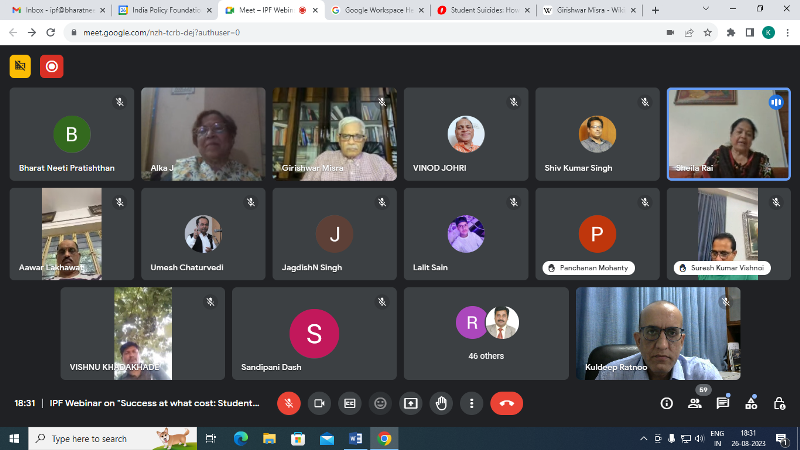
The curriculum that we have is very wide and comprehensive. Unfortunately, we have not included in a meaningful manner, in the course curriculum as to how students will face challenges and how they can maintain their equilibrium. And they should be taught how to deal with failures as well. Unless and until, you train them for that and give them the mental makeup, just making them want to excel is not what you should be driving them to. Secondly, what I feel is the parental pressure, the peer pressure. It is only fair that the very existence of coaching centres is being questioned. But it remains a reality which cannot be overlooked. It the responsibility of us parents to go and check in what conditions are our kids living in the coaching institutes. They are young adults who are not in a position to share their fears with anybody. We need to ascertain if they are in a happy place. The biggest problem is the teacher-student ratio which is so skewed. You go to coaching centres, there is just one teacher for nearly 150 students. It is impossible for the teacher to know which student is going under pressure and agony. In St. Xavier’s College, I had insisted that there should be a counsellor. But when it comes to a coaching centre with so many students, even that becomes perfunctory. It is impossible for a counsellor to see so many students. The students do not have an outlet. They do not have somebody they can share their problems with. And especially, in this age of single child, small family norm, it becomes even more difficult.
Social media has further added to their miseries because they don’t communicate directly. They live in a virtual world and they get alienated from their own friends and family and this further aggravates the problem. So, I feel we need to take some corrective measures and especially as academics, if we can insist that in the course curriculum itself, we include a section where we prepare our students to face challenges and teach them how to accept failure, I think the situation would slightly improve, if not improve completely. Those are the little remarks I wanted to make. Thank you.
Discussion
Prof Panchanan Mohanty: We are getting off-rooted from the culture. Nowadays, parents are interviewed to see if they could speak English or not. Instead of that, they should be asked if they can tell a folktale or sing a folksong. In my generation, we have heard umpteen number of folktales and folksongs from our mothers and grandmothers and that gives a lot of strength. Nowadays, there are hardly any mothers who tell a folktale to their children, even in the villages. Next the problem is nuclear family where the bonds are completely gone. Moreover, most of our parents are formally educated. I appreciate Bhutan’s Gross Happiness Index. We don’t know what happiness is. I strongly believe our education system has to be overhauled. There is no culture in our education. Let the culture come back and let it be part of a strong foundation in our education system.
Suresh Kumar Vishnoi: I feel parents are responsible for a child’s suicide. From an early age, they put too much pressure of their expectations on the child. The next are the coaching class which leads to loneliness and mental pressure to succeed. In this situation, the parents also do not interact with the kids to ensure that they don’t come back home leaving the course. Third, the child is often unable to bear when their peers move ahead leaving them behind. The fourth aspect is that India does not have enough jobs in proportion to its unemployed population. My suggestion is that children should be taught entrepreneurial skills from a very young age so that they can be self-reliant. I have a question related to my personal life too. My wife is putting pressure on my son to prepare for the civil services, saying that there should be at least one officer in the family and I am confused on what to do. Please advise.
Dr Ratnoo: The main reason for this is parents also are living in a world of anxieties, and insecurities. This frustration gets projected on to the children, unknowingly. Second, the parents are trying to fulfil all their unrealised desires through their children. The children are even made to wear the kind of clothes that the parents wanted to wear. The parents keep projecting these things on to their children, without understanding in which field does the child’s aptitude and skills really lie. This is a very big challenge. We expect the fish to run a race and the monkey to go for swimming, and an elephant is expected to climb a tree. Every child has his/her unique qualities. Along with parental pressure, peer pressure also plays an important role in the choices that are made. We should let a child become what he/she wants and not put any pressure.
Navya Misran: Something I keep hearing from older people around me that they used to tolerate a lot more and our generation is weak. Personally, I find it quite offensive as it feels like we are being held responsible for what is happening to us as if it is a choice and as if it is completely under our control. Our problems aren’t considered problems because they are so abstract in nature. I feel like there is a lot of pressure and I don’t have words to explain. Can you please contribute to that?
Vinod Johri: Parents pressurise children even from primary classes.
Kuldeep Singh Rathore: Students and children were very different in the earlier times. There were no words like frustration, motivation and depression. During those times, schools used to concentrate more on moral values than the subjects.
Pragya Tak: Why have the families become so intolerant to failure? They want the kids only to be educated in the premier institutes and a foreign education has become the parameter of success. Moreover, the mother figure in a family is seen as an ATM by the kids. How can this complex situation be addressed? Also, there is a huge difference between what students study in school and the questions they are asked in entrance exams. This is putting additional pressure on kids and parents to go for coaching.
Ajay Bharti: Please throw some light on the early symptoms of suicidal tendencies. Also, on the role of narco-terrorism mafia in targeting youth in a manner that drives some to suicide.
Pramod Ranwaka: It should be mandatory to publish the rate of success in the advertisement published by coaching institutes. Students must have at least three options of career when they join coaching classes to overcome stress. Pressure of achieving fast success is one of the root causes.
Pargya Tak: Lately, some blame should also be given to branding of IITs, NIITs, AIIMS, in terms of salaries offered to their students and kids and parents start chasing that. Things are so bad that kids and parents see these institutions as the golden pass to great materialistic life and social respect. In this process, they do not see any future outside these social institutions. People are pledging their farms to pay the fees of the coaching institutes.
Governments of late are taking some corrective steps but they are not enough. For example, IITs want their own exams on top of JEE and AIIMS also want their own exam over NEET. Indian UG entrance exams are a maze. It only adds to the pressure.
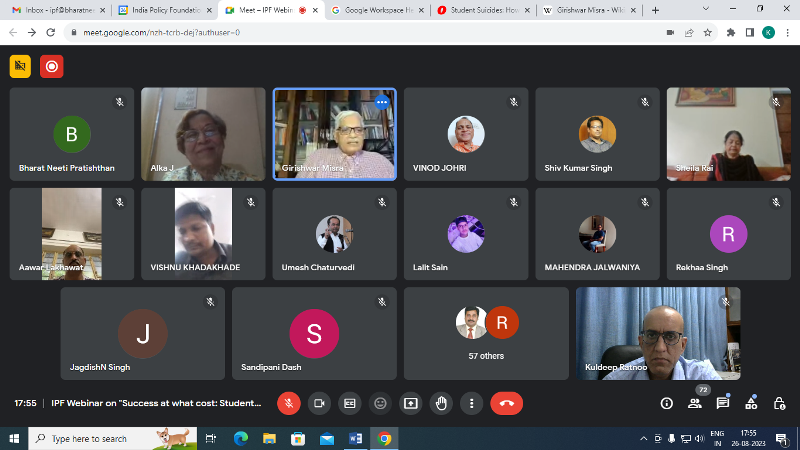
Anju Siwach: During career, many moments come in life and we feel so much depressed. At that moment we think that there is nothing left in life and we can’t fight more. What can be done at that particular moment?
Navya Misran: The idea that we are sad because of our level of endurance is low is flawed. The problem is not lack of endurance, the problem is that we are enduring far too much, way more than what we physically can. The pressure is inhumane. The dialogue around this issue just focusses on blaming our generation and that is what stops us from seeking help.
Dr Jadgish Singh: How would we inspire younger generations to contain greed when leaders are generally so greedy? Ours in a nation, the culture of which manifests itself in the adage, “yatha raja, thatha praja.”
Bhopal Lakhawat: I am from Kota and I see these incidents regularly. In coaching, dreams are being sold in the quest of making money and it raises anxiety and stress.
Mahendra Jalwaniya: Nuclear families are also responsible for suicides. In joint families, stress was released by brothers, sisters, grandparents, uncles, aunts etc. But nowadays, both the parents are busy in their career and children feel lonely and they end up committing suicide.
Navya Misran: What are some direct effects of unconditional positive regard? What is your opinion on the Indian ‘tough love’ style of parenting that is followed in many households? Just because it has been practiced by a lot of people in the past, does that mean it is right?
Dr Ratnoo: There are important questions that has come up in the discussion. One is about the suicidal tendencies and the other is about the tough love parenting.
Prof Wadkar: The first question is very important and significant. The person who has the idea of suicide in his mind will show some changes in behaviour. General personality changes. Sleep and diet, everything changes. Either he will eat less or eat more; sleep less or sleep more. Then he will be very apathetic. He is not interested in any social gathering, no friends or anything. He will start giving things away because he thinks that now it is of no use to him. Then he will close his bank account as if he is saying goodbye to the world. Then he will tell somebody that he is going to quit and that there is no solution to his problems. It is essential for the family members and friends to concentrate on what the person is doing and then they should be very vigilant about what he is doing. He should not be left alone. His ideas regarding killing himself should not be encouraged. There are certain positive things in everybody’s life. So, we should attract his attention towards that and change his routine. He should be involved in some hobbies. Emotional catharsis is essential. Why he wants to kill himself should be discussed and then, obviously he will be in a better position. Of course, professional help should be taken.
The second question is regarding unconditional positive regard. As I was mentioning, you have to respect your children. If a child says that he has stomach pain, then immediately the mother will say that because you don’t want to go to school, you are saying that. How can you judge that? He is an independent human being, you have to respect what he is saying. But in Indian situation, parents are taking it for granted that they can understand everything. So, what you have to do is you have to respect your child and accept what he is saying. In unconditional positive regard, even if your child fails, you have to be supportive and tell your child that it is okay and you will be there for him. That particular type of communication should be there, not that nagging and scolding the child. It is not the way to express. Even if they feel bad, you should not reject the person as such.
One thing everybody must remember is that whatever may be the case, maybe suicide, pornography addiction or whatever, the person himself has to understand his inner line. That is, intra individual communication should be quite clear. He should understand and accept himself as he is and he should see himself as a worthy person. He should help himself to regulate his behaviour and regulate his thought process. There are certain things that nobody else can control other than the individual. It is only the individual who can improve upon his life, who can improve the possibilities of utilising his potential to the fullest. Nobody else can do that. The self-discipline should be maintained.
Dr Ratnoo: There is a question for Sheila-ji. What should be the course of action if a friend is showing suicidal symptoms but showing resistance when it comes to seeking professional help? It is very difficult to initiate a conversation with parents because not all parents take the issue of mental health seriously. They are scared of seeking psychiatric help for their child. How do we proceed in such a situation?
Prof Rai: Unfortunately, we attach a stigma to mental health and that should not be the case. Given the circumstances that we are living in, I do not know when we will come to understand that our psychology and our mental faculties are part of our entire being. And if you can go to a doctor for your physical ailment, you should be able to go to a counsellor for your psychological ailment as well. That is why I said all these coaching institutions should have adequate number of counsellors because many a times you are not able to confide in your parents or consult your parents on particular subjects. The expectations of the parents are so high and all parents cannot claim to be on the same level. Therefore, it is important that the counsellors whom we appoint are so well trained that to detect those warning signals that Alka ji was pointing out. Somebody’s self-esteem will be very low, he will talk in a very negative manner and he would be very disinterested in most things. These are the warning signals which you and I can not easily identify as a counsellor can because he/she is trained in that particular field.
Therefore, I understand that the cultural values are very important. Unless and until, you imbibe the cultural values, the road is not going to be very smooth. But in the present circumstances, what we can do is we can at least recruit the counsellors and include counselling in our syllabus as well so that the children know how to counter these challenges and know how to face these situations. Also, if they are in trouble, they can go without any kind of shame and talk to the counsellor. As I said, the teacher-student ratio is so skewed that how can the teacher identify the warning signals in students. But if the counsellor is there, who are easily available, students can go and confide in them and seek some help which will prevent them from taking the extreme step of suicide.
Anju Siwach: Here, everyone is talking about culture, but no one is talking about the fact that as a student, we feel depressed because of the pressure of seminar, assignments, attendance, exam preparation, entrance etc. and no one cares for our struggle. We are unhappy but we don’t know whether it is stress, depression or something else. What is the solution for this problem?
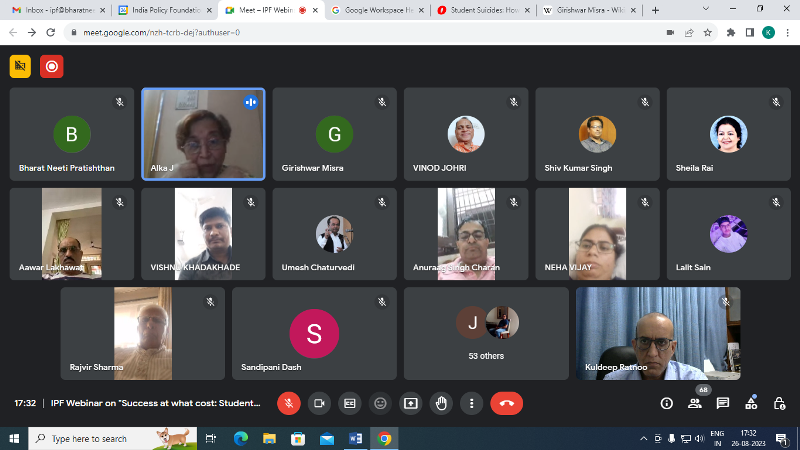
Prof Wadkar: The first thing is time management. If there is huge amount of work that we cannot manage, the first thing is are we wasting our time in social gatherings, parties or fun making activities? There are certain things that are important and urgent and there are certain things that are not important and not urgent. You should classify your activities and identify what you are doing. You should take care of your health. And you should be particular about your own future. If you really want to complete that particular course, don’t think about the remaining things. There is a whole life that is waiting for you. Afterwards, you can have all the fun that you want. Now is not the time. If you want to take the help of a counsellor, it is available. The counsellor will be able to give suitable advice for you to enhance your self-understanding and self-discipline. This will help you go ahead. Nobody else can change your life other than you.
Dr Kuldeep Ratnoo:
Thank you, Prof Alka ji, Prof Sheila ji, Prof Girishwar Misra ji and all the participants. In concluding, I just want to add one thing that every human being comes with a purpose. There is some divine project. So, never feel that life has ended or that there is nothing more to do in life. There is always a tomorrow. There will always be a sunrise after the sunset. There will be darkness but there will again be light. So, never feel as if you have lost everything. Rise and fall are part of the game and every successful person faces these kinds of upheavals. It is like what we see in the share market. One day, the market is up and another day, the market goes down. But it does not mean that a person loses trust in the market. Same way, for a sportsperson, one day you score a century and, in another match, you get out without scoring a run. One film becomes a super hit and, in another film, you don’t see the audience appreciating the movie. One novel is best seller and another, nobody is taking note of. One teacher, one year produces excellent result and, in another year, the result is not up to the mark. So, all these are part and parcel of life. Things will come and things will go. Never lose hope. Always feel that I have come to this earth with a purpose. It may involve certain amount of struggle, certain number of failures. You have to overcome that and you have to continue living. And don’t compare yourself with others. Never compare yourself with others because in that manner, nobody will ever be satisfied.
We have heard all the speakers. It was an excellent discussion. There were very good suggestions and very good questions also. Once again, I thank all of you who joined this webinar and patiently listened to our speakers. My gratitude to Prof Girishwar Misra ji, Prof Alka ji, Prof Sheila ji and all the learned participants and young students.
Thank you very much!

